Germany
Factsheet
| ETHNIC MINORITIES: | |
|
Turkish: Roma: |
2.4% 0.13% |
| RELIGIONS: | |
|
Protestant: Roman Catholic: Muslim: |
34% 34% 5.0% |
| NET MIGRATION: | 550,000 |
| POP. GROWTH RATE: | +0.1% |
| GDP GROWTH: | +1.3% |
| GDP PER CAPITA: | 41,863 |
| UNEMPLOYMENT: | 5.3% |
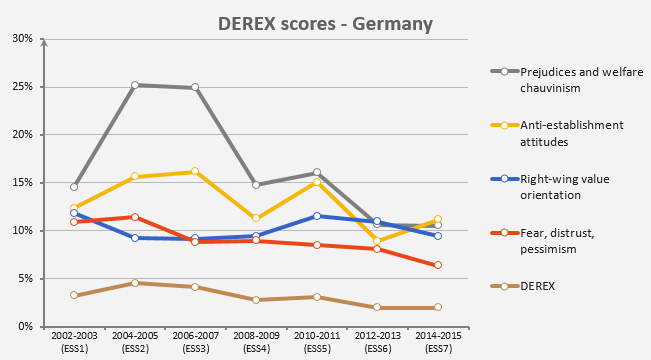
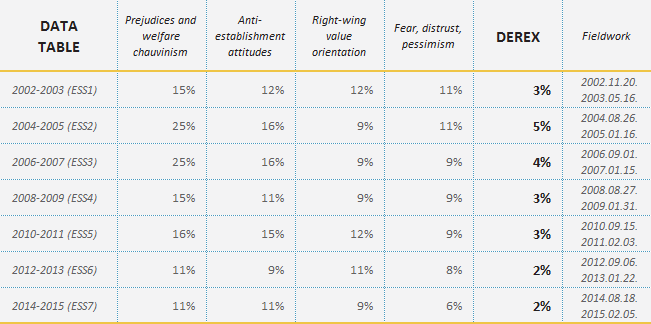
National Democratic Party of Germany (Nationaldemokratische Partei Deutschlands, NDP)
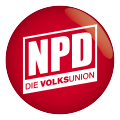
By its own definition, the NPD is “Germany's oldest nationalist party.” The organization was established in 1964 and first stood for Parliament in 1965 in the former West Germany. Since then, support for the party has been fluctuating between 0.1 and 2%. In the 2013 general election it gained 1.3% of the votes. The party is represented in two of the 16 regional parliaments, while it has no delegate in the Federal assembly. At the regional level the NPD is significantly more capable as it is able to command the strongest support in the former East-German territories. Due to the party's chauvinistic and intolerant terminology (“Germany is ours alone, Germans”) and the military nature of its marches, it qualifies as a neo-Nazi party. The NPD has created a special ideology mixing existential security and the socialist/communist cult of work with the fundamentals of social-Darwinism. The option of the organization’s ban came up a number of times on constitutional grounds, although all such attempts failed when in 2003 it was revealed that most of the government evidence presented in court came from the secret services that had infiltrated the inner circles of the party. As a result, albeit with little public support, the NPD continues to operate in Germany to this day. In February 2014, the German Constitutional Court abolished the 3% parliamentary threshold in respect to the EP elections on constitutional grounds, a ruling that favors small parties such as NPD. Accordingly, the party’s major objective in the upcoming European election is sending its former leader, Udo Voigt to the EP with the mission of developing strategic alliances with other European nationalist forces.
(Updated on 15 August, 2016)
NDP on the Internet:
Sources:
- Piero Ignazi: Extreme Right Parties in Western Europe. Oxford; New York: Oxford University Press, 2003, Ch. 4.
- “Battling Right Wing Extremism: German States Give Green Light on Bid to Ban NDP.” In Spiegel, 14.12.2012. Available online at http://www.spiegel.de/international/germany/german-legislative-chamber-approves-bid-to-ban-neo-nazi-npd-a-872969.html
- Political Capital
Alternative for Germany (Alternative für Deutschland, AfD)
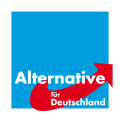
Alternative für Deutschland was founded by Bernd Lucke, Alexander Gauland and Konrad Adam in 2013. The party at the time had a plethora of members with Ph.D.s and its Eurosceptic manifesto called for empowering national governments to get rid of the Euro, mandating referenda for some EU policies and opposing German-backed bailouts for poorer southern European countries. The party’s moderate leader, Bernd Lucke quit the party in July 2015, as he felt xenophobic voices had got stronger in the previous months. Right-winger Frauke Petry, who leads the party at this time, took over and the AfD formally adopted a clear anti-Islamic stance on 1 May 2016. The party’s manifesto states “Islam is not a part of Germany”. The manifesto rejects minarets and the Muslim call to prayer and the party officially supports a ban on full-body veils. AfD’s manifesto officially only calls for the country’s exit from the Eurozone but Franz Wiese said after the Brexit vote that AfD would make it to the federal parliament in 2017 and then ‘Dexit’ would be on top of AfD’s agenda.
After its formation in 2013, the party gained 4.7 per cent of the vote in the federal elections of that year. In the European Parliament elections in 2014, the AfD gained seven seats and joined the European Conservatives and Reformists (ECR) group, however, only two of the seven are still party members. After AfD member Beatrix van Storch said German border guards should use firearms to stop asylum-seekers from entering the country, she was expelled from the ECR and subsequently joined the European Freedom and Direct Democracy (EFDD) group. After the onset of the refugee crisis, AfD has made huge strides, culminating in its success at the regional elections in early 2016, gaining 24.2 per cent of the vote in Saxony-Anhalt, making it the second largest formation in the state.
Since then, the party has been in trouble for several racist incidents. AfD split in Baden-Wuerttenberg after Wolfgang Gedeon referred to the Holocaust as “certain deeds” and suggested Holocaust denial was legitimate. Alexander Gauland, the deputy leader of the far-right party, said people would not want football star Jerome Boateng as a neighbor. After his comments were criticized, Gauland said he did not know the footballer “has German citizenship, that he is Christian and well-integrated.” As a consequence of the controversies, after polling as high as 15 per cent nationally, AfD’s support dropped to 11 per cent by August 2016.
In a regional election in Mecklenburg-Vorpommern the AfD gained 21 per cent of the vote, beating out Angela Merkel’s CDU in the state which is home to the chancellor’s constituency. The gains can clearly be attributed to the dissatisfaction with Angela Merkel’s refugee policy even though the number of asylum-seekers in Mecklenburg-Vorpommern is relatively low. Despite the far-right party’s gains, they will have to remain in opposition as the Social Democrats and Merkel’s CDU have enough of the vote to continue their governing coalition. Furthermore, the state appears to be an outlier, because a large amount of the state’s youth have left since German reunification and the economic stagnation of Mecklenburg-Vorpommern steered the population towards the extremes.
Pegida’s leader Lutz Bachmann founded a political party, which will be called Popular Party for Freedom and Direct Democracy. Bachmann said “We will support the AfD in the next elections and we will have direct candidates in only a few constituencies”. AfD leadership is said to be divided on whether to embrace Bachmann’s support. AfD’s Ronald Glaser told Sputnik News that the party does not seek formal cooperation with Pegida and they should stay what they are, a movement in Dresden, however, the official line of Alternative for Germany is not yet clear on this issue.
(Updated on 7 September, 2016)
AfD on the Internet:
Sources:
- German AfD Party Rules Out Cooperation with Pegida. http://sputniknews.com/europe/20160719/1043283950/german-afd-pegida-cooperation.html
- German far right Pegida movement seeking to establish political party, says Lutz Bachmann. http://www.ibtimes.co.uk/german-far-right-pegida-movement-seeks-establish-political-party-says-leader-lutz-bachmann-1571352
- Germany’s anti-Islam Pegida movement launches political party. http://www.politico.eu/article/germans-anti-islam-pegida-movement-launches-political-party/
- AfD leader:I didn’t know Jergome Boateng was ‘colored’. http://www.politico.eu/article/afd-leader-i-didnt-know-jerome-boateng-was-colored-alexander-gauland-alternative-fur-deutschland-for-germany-jerome-boateng/
- ‘Jerome be our neighbor!’. http://www.dw.com/en/jerome-be-our-neighbor-boatengs-german-fans-rally-round/a-19292235
- German far right MEP who said shoot illegal immigrants joins Farage’s EU group.http://www.ibtimes.co.uk/german-far-right-afd-mep-who-said-shoot-illegal-immigrants-joins-farages-eu-group-1554093
- German state elections.http://www.dw.com/en/german-state-elections-success-for-right-wing-afd-losses-for-merkels-cdu/a-19113604
- The voters who want Islam out of Germany.http://www.theatlantic.com/international/archive/2016/05/afd-germany-anti-immigration/484700/
- Germany’s far right ‘cries for joy’ after UK votes to leave EU.http://www.thelocal.de/20160624/german-far-right-leader-calls-for-a-new-europe-brexit
- Anti-Semitism row splits Germany’s AfD populist party. http://www.bbc.com/news/world-europe-36722818
- Germany’s AfD adopts anti-Islam stance at party conference.http://www.wsj.com/articles/germanys-afd-adopts-anti-islam-stance-at-party-conference-1462120609
- Far-right overtakes Merkel’s conservatives in regional vote.http://www.politico.eu/article/far-right-afd-overtakes-merkels-conservatives-in-regional-vote/
- Angela Merkel stands by refugee policy despite AfD gains.http://www.politico.eu/article/german-chancellor-angela-merkel-stands-by-migrant-refugee-policy-despite-afd-gains-mecklenburg-vorpommern-regional-elections/
European elections - May 25, 2014
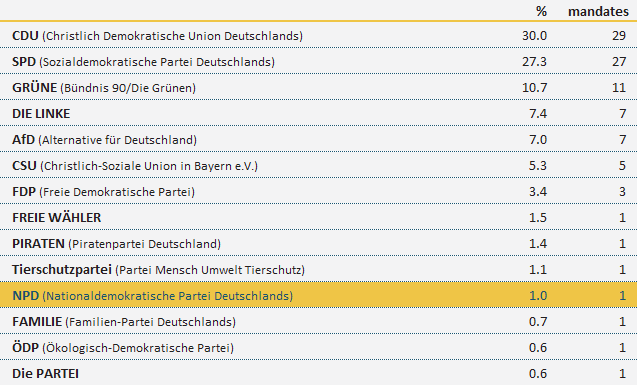

Parliamentary elections (second votes) - September 22, 2013


Parliamentary elections (second votes) - September 27, 2009


European Parliament elections - June 7, 2009


Parliamentary elections (second votes) - September 18, 2005

Source: The Federal Returning Officer, EP2014
Our thematic websites
Political Capital's analyses and activities in English.
Research and advocacy programme focused on the role conspiracy theorising plays in shaping populist and radical politics.
Our project New electoral system in Hungary: watchdogging, advocacy and raising awareness focuses on the electoral reform in Hungary.
Our blog on political and societal extremism and conspiracy theories.
DEREX website is supported by










